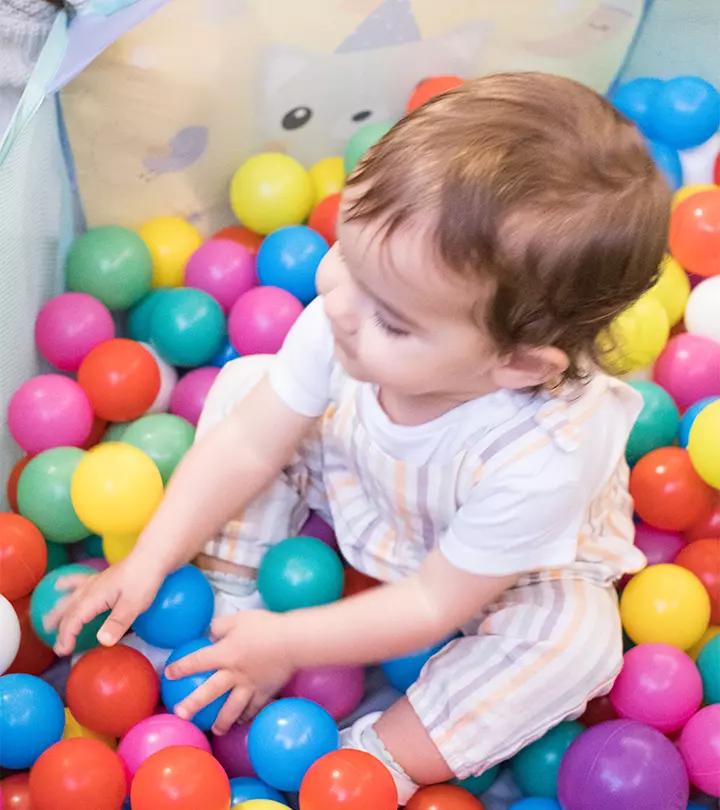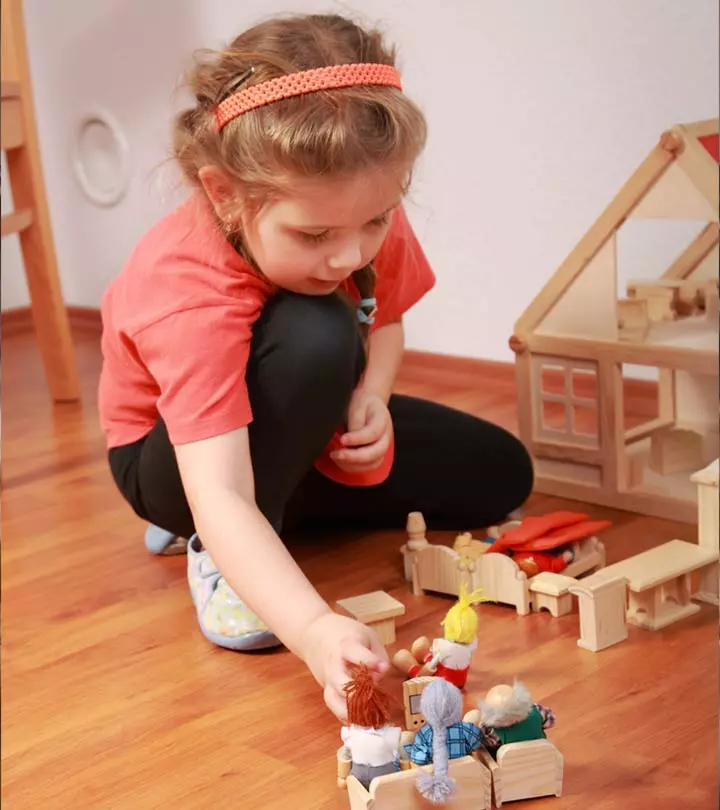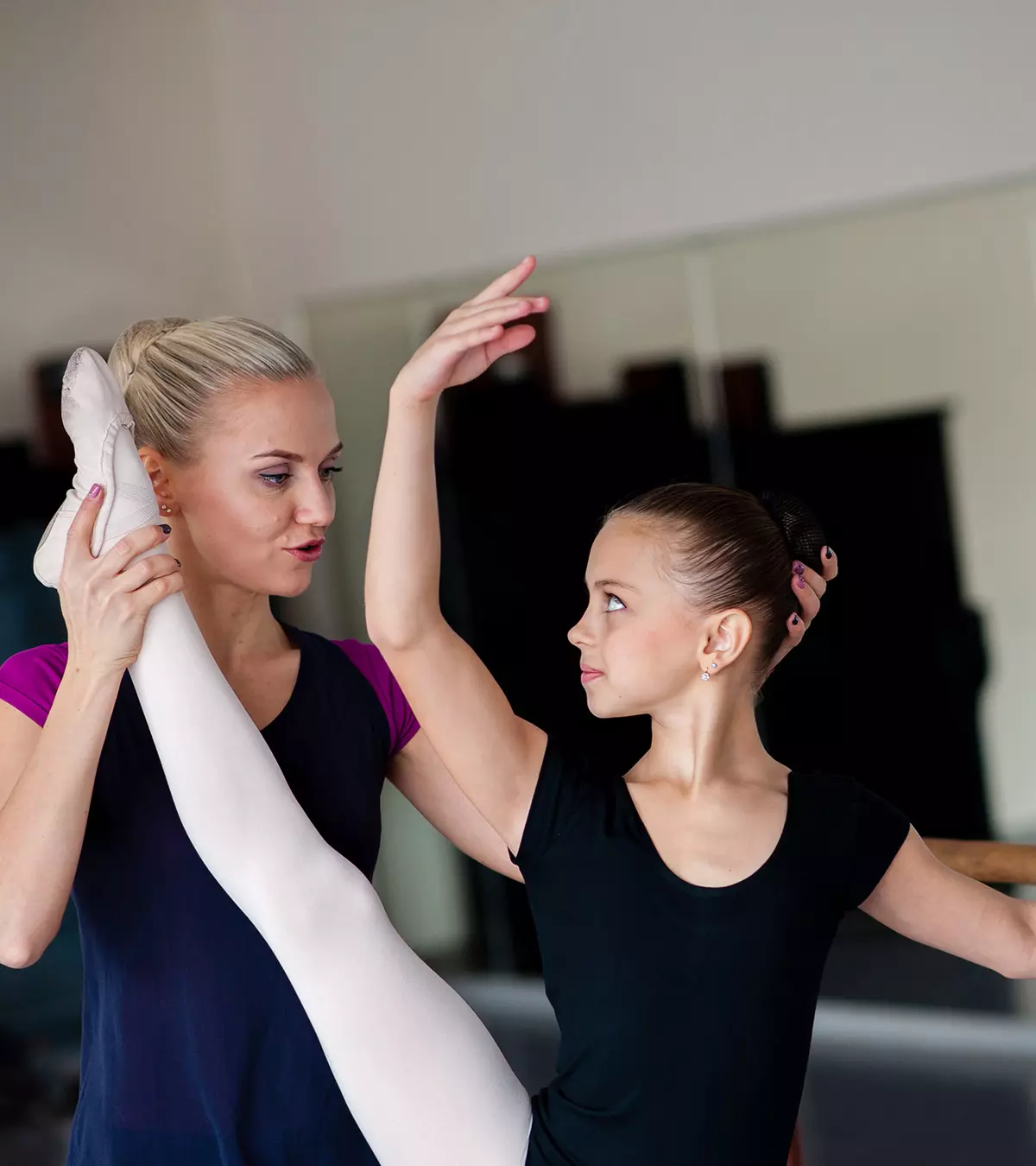
Image: ShutterStock
Extracurricular activities for kids could promote self-reliance, social skills, and self-esteem in them and aid in learning life skills outside the classroom (1). These informal learning techniques may include athletics, social volunteering, theater clubs, internships, etc. It is common for many people to choose their careers based on these skills in later life. Read on to know interesting extracurricular activities that will keep your kids engaged. However, do not force them to participate in activities they are not interested in.
Key Pointers
- Extra-curricular activities will help your child improve academically, become a good team player, and develop confidence.
- For children who love arts, instrument playing, painting, and dance are good choices.
- New language learning and the study of robotics are interesting extracurriculars too.
- If they are adventurous, they could try scouting or photography.
Benefits Of Extracurricular Activities For Children
Extra-curricular activities and games help boost skills vital for the psychological and socioemotional development of a child. They also help in (2) (3):
- Reducing screen time due to free time management by learning new skills.
- Improving academic performance by boosting brain functions.
- Alleviating boredom, stress, and pressure by providing an opportunity to make new friends with similar interests.
- Learning the value of optimum utilization of tangible and intangible resources, such as time and money.
- Developing resilience, reducing self-doubt, and promoting self-esteem and confidence.
Darius El, a father and content creator, shares how extracurricular activities have boosted his children’s confidence and self-awareness. He says, “You know, swimming has helped him become more confident, not only in the water but in himself. And when we were playing soccer, and he would score that goal, you could see the confidence on his face… You can see his confidence growing, see them being more sure of themselves. It helps them with their identity; it helps them to know who they are (i).” - Fostering a sense of commitment by helping set SMART (Specific, Measurable, Relevant, Time-bound) goals at the personal, academic, and professional levels.
- Developing teamwork and leadership abilities necessary for personality development.
- Promoting an understanding of the concept of different perspectives through group activities.
Participation in extra-curricular activities could also help a child or teenager introspect their interests to pursue a career in the long run. According to research conducted by the US Census Bureau, children involved in extracurricular activities were likelier to be involved in school. As seen in the graph below, children who played a sport were more engaged in school at 38%, while students who did not participate in sports were 34% more likely to be involved in school. Similarly, students who were part of a club tended to be more active in school than children who were not a part of any club.

Percentage of children engaging in school when involved in extracurricular activities
Source: School Engagement Higher for Children Involved in Extracurricular Activities; US Census Bureau17 Extracurricular Activities For Children
Extracurricular activities provide opportunities for children to learn and demonstrate their talents. From sports and games to creative activities like painting, and community-based activities like volunteering to debates, here is a list of extracurricular activities your child can take up based on their interest.
1. Sports

Children can participate in sports, such as basketball, badminton, volleyball, cricket, swimming, tennis, table tennis, chess, and martial arts, as per their interest and motivation. They can play in the school team or an extramuraliOutside the walls or boundaries of an educational institution or regular course team. Sports activities promote mental and physical health and, in the long run, could support problem-solving, critical thinking, self-management, and teamwork skills necessary for personal development (4).
Brooklin Erin, a mother and an elementary school teacher, discusses the social benefits of extracurricular activities through her son’s experience. She shares, “When my son went to high school, he was overwhelmed with the number of kids at the school. By joining sports teams, he was able to find peers that had the same interests as him, and ultimately, this became his peer group for the remainder of his high school years (ii).”
2. Cooking

Cooking can be considered among the engaging life skills for kids that can help promote healthy eating habits. Let them begin with basic cooking activities for kids, such as kneading and mixing, that promote gross motor skillsiUse of large muscles and core muscles for whole-body movement for different tasks . Gradually, their learning diversifies, based on culinary methods, cuisine, and creativity. Research conducted by the Basque Culinary Center found a connection between involving children in cooking and their dietary choices. The report states, “This study demonstrated that involving children in cooking can increase their willingness to taste novel foods and direct food choices towards foods containing vegetables (5).”
The American Academy of Pediatrics recommends turning cooking time into a learning opportunity for kids. You can teach them skills like counting, understanding fractions, measuring, exploring basic science concepts, expanding vocabulary, and following instructions (6).
 Quick tip
Quick tip3. Pottery
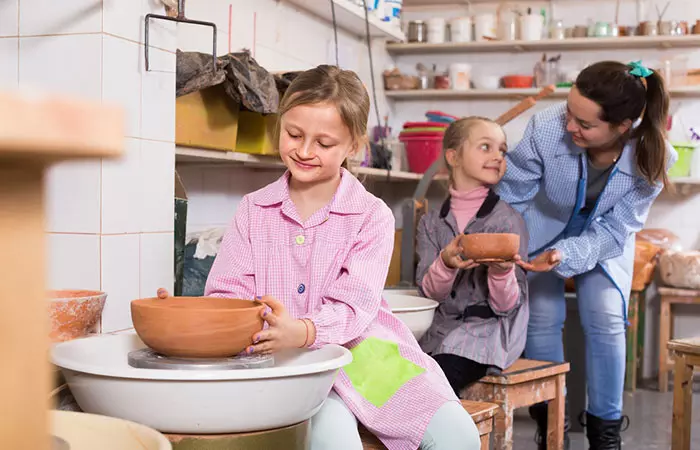
This engaging and entertaining creative activity is suitable for children above seven years of age. Involving your child in this stress-reducing and calming art can boost their creativity, cognitive skillsiMental abilities required to learn, reason, and solve problems , and promote motor and sensory developmentiProcess by which a child learns the use and coordination of the muscles and sense organs . Besides, it provides an opportunity to self-express, and could enhance self-esteem and confidence (7). Motivate your child to participate in pottery competitions and to display their creativity.
4. Scouting

Scouting is an extracurricular activity that involves children and teens in local community activities such as hiking, backpacking, sports, camping, first aid, and sports. Some international scouting programs, like SpiralScouts International, allow children as young as three years to enroll. A scout group usually has 20-30 individuals and a leader involved in several outdoor tasks. These features make scouting one of the most effective leadership activities for kids to learn the value of responsibility and resilience (8).
5. Student media
By participating in student media, your child gets hands-on experience working on school/college/university websites, newspapers, radio, television, podcasts, magazines, and social media services. Exposure to several media types hones their written and verbal communication skills. Besides, working in a professional environment boosts confidence and supports personality development.
6. Volunteering
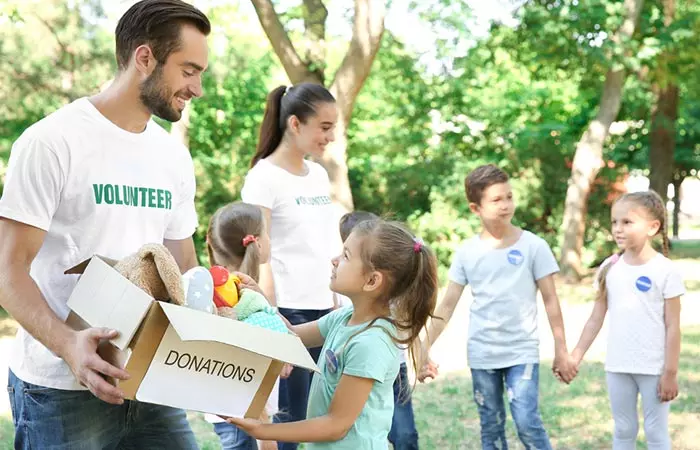
Volunteering is a responsible and accountable social interaction activity that children opt out of passion and dedication. Participating in charity and non-charity community services with religious and non-religious organizations, such as hospitals, senior citizen care centers, orphanages, etc. hones self-management and team management skills. It introduces them to new experiences, builds their confidence by showing they can make a difference, and helps them develop civic responsibility and community bonds. It also makes your child an empathetic, compassionate, and confident individual with structured communication and social skills (9).
7. Book club

Book clubs are small communities of avid readers. You can motivate your child to participate in a children’s book club to meet several reading enthusiasts of their age. Book clubs often organize learning activities that boost children’s vocabulary, reading, and oratory skills (10). Also, the discussion sessions promote public speaking skills necessary to develop self-esteem and confidence.
8. Foreign language

Communication skills for kids hold paramount importance primarily because they enable them to express their emotions and thoughts with clarity and confidence. Foreign language classes are an excellent opportunity to learn a new language and tune your child’s communication skills. Learning a foreign language helps children improve their problem-solving, memory, and communication skills while boosting their confidence. This activity can also open the doors to new cultures and history, which adds to your child’s general knowledge (11). Additionally, speaking and writing a new language can make a child excited, motivated, and happy, which positively impacts their personality development.
 Did you know?
Did you know?9. Robotics

Children above seven years of age interested in technology, engineering, and math can consider joining a robotics class. Robotics classes have a structured activity-based learning plan that works on STEM (Science, Technology, Engineering, Mathematics) principles. Participating in such classes boosts your child’s cognitive development, fosters creativity, team building, and problem-solving skills, and enhances confidence (13).
10. Instrument playing
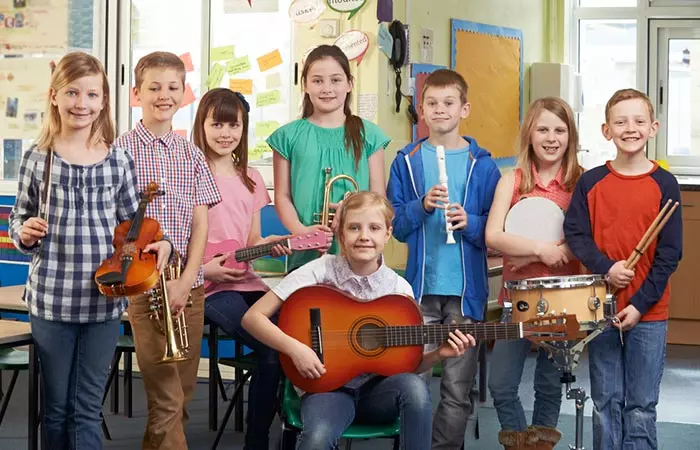
Music is relaxing and calming, and offers numerous benefits, including improving your memory, concentration, and emotional well-being. It helps reduce stress, enhances brain function, and strengthens your ability to focus and multitask (14). Children above five years of age can learn to play any instrument of their choice in their school/college or from a private tutor. From mouth organ to clarinet or drums, playing a musical instrument promotes brain development, hones cognitive skills, and builds discipline. Motivate your child to join a music class to learn the basics of playing instruments. They may also join their school band as a part of extra-curricular school activity.
11. Dance
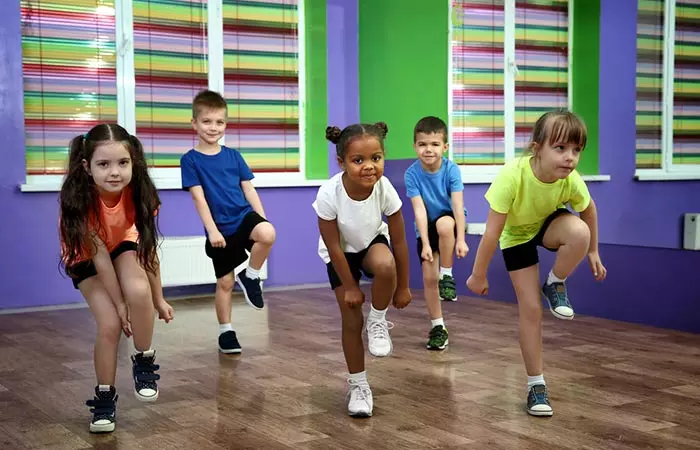
Dancing is an exciting extra-curricular activity offered by almost every school. Children can learn more than one dance style and participate in different competitions and events. Motivate your child to learn dance as it boosts physical fitness, sharpens mental skills, develops flexibility and agility, and fosters socio-emotional maturity (15).
12. Theater
This performing arts activity is suitable for children above three years of age. Participation in drama and theater activities could support socio-emotional and cognitive development. It could even help fine-tune your child’s communication skills and boost their personality development (16). Motivate your child to join their school/college theater group and learn the basics.
13. Painting

Painting is a de-stressing craft that boosts your child’s creative thinking, promotes emotional growth, and hones cognitive skills (17). If your child likes to paint, motivate them to join a painting class at school/college, or enroll in a professional painting class.
 Quick tip
Quick tip14. Photography

Photography is a way to express oneself. Children above five years of age can learn basic camera functions. Once your child is older than eight years, they can learn advanced photography techniques. If your child likes clicking pictures, then motivate them to take it up as an extracurricular activity. It could help boost their cognitive skills and also nurture creativity. It also benefits children by sparking curiosity and increasing their interest in the subjects they capture (18).
15. Environment club
Joining an environment club and engaging in activities such as gardening promotes teamwork, personal management, and communication skills. It also helps children develop eco-awareness, take action to solve local issues, and learn about sustainability and green technology (19). Most schools/colleges have an environment club responsible for spreading awareness about eco-friendly techniques and methods to alleviate environmental issues. If nature and its conservation interest your child, then an environmental club is a perfect choice for them.
16. Yoga
The practice of yoga and mindfulness has demonstrated positive effects on the overall well-being of school-age children, typically ranging from 6 to 12 years old. In this age group, yoga contributes to enhanced balance, strength, and aerobic capacity. Moreover, the practice of yoga and mindfulness extends psychological benefits to children. Specifically, it has been observed that yoga can enhance focus, memory, and academic performance. Additionally, it plays a role in alleviating anxiety and stress among children (20).
17. Debate club
Engaging in debate activities plays a crucial role in fostering critical thinking skills, teaching children effective expression of their opinions, and instilling confidence in public speaking. Participation in debates contributes to developing research skills, as it often necessitates in-depth exploration of various topics (21). Additionally, debating empowers children to enhance their conflict-resolution abilities and learn the art of expressing thoughts respectfully. A debate club is a valuable platform for preparing your child in these essential aspects.
How To Avoid Extracurricular Overload
To help prevent your child from feeling overwhelmed by extracurricular activities, consider these tips (22) (23) (24) (25) (26) :
- Choose activities wisely: Opt for a few meaningful activities instead of overcrowding their schedule. This helps prevent stress and exhaustion.
- Listen to your child: When they show excitement about certain activities but dread others, take note. Let them pursue things they genuinely enjoy.
- Set realistic limits: Make sure your child has enough time for homework, rest, and family life alongside their activities. A packed schedule often creates unnecessary pressure.
- Watch for signs of overload: If they seem cranky, always tired, or their grades start dropping, these might be signs they’re doing too much. Don’t hesitate to cut back on activities if needed.
- Encourage free play: Allow time for unstructured play, whether that’s building with blocks, drawing, or making up games. This free time helps them relax and use their imagination.
Frequently Asked Questions
1. How many extracurricular activities should a child be involved in?
Though there is no fixed limit on the number of activities a child can engage in, many children can manage around two to three activities. However, observe whether these activities affect your child’s sleep, homework, or time spent with family and friends. If any of these areas are affected, it may be wise to cut back on one or more extracurricular activities.
2. When should children start extracurricular activities?
More than age, your child’s interest, and personality would be a better determiner of whether they are ready to participate in extracurricular activities. Since some children display maturity and interest in specific hobbies from a young age, they can be encouraged to pursue these activities in an age-appropriate manner.
3. Can extracurricular activities be a source of stress for kids?
Extracurricular activities can sometimes be a source of stress for kids. While these activities offer numerous benefits such as skill development, social interaction, and personal growth, they can also create added pressure and stress due to engaging in too many extracurricular activities, high expectations, competitiveness, struggle with time management, and peer pressure.
4. Are there any risks associated with participating in certain extracurricular activities?
Activities such as sports, dance, martial arts, or outdoor adventures carry a risk of physical injury. Intense competition, performance pressures, or demanding training schedules can contribute to emotional and psychological stress for some extracurricular activities. Lastly, overcommitment to extracurricular activities can impact a child’s academic performance.
5. How can parents support their child’s extracurricular activities without becoming overly involved?
Encourage your children to take ownership of their extracurricular activities, set goals, and manage their commitments. Offer guidance and support, but allow them to navigate their experiences. Regularly check with them to understand their experiences, challenges, and achievements. Ask open-ended questions and listen actively to show your interest and support.
6. How do extracurricular activities improve children’s resilience and adaptability in facing challenges?
Extracurricular activities expose children to new challenges and experiences in a supportive and supervised environment. Losing in sports can help them build resilience, and games such as chess can help improve their critical thinking skills and make them perform under pressure and tackle unexpected challenges. Similarly, engaging in acting or dancing can help them overcome stage fear and build confidence.
Extracurricular activities for kids like sports, cooking, pottery, painting, scouting, volunteering, music, and dancing offer learning opportunities for them outside of formal education. Participating in these activities will also help in your child’s physical, cognitive, and socio-emotional development. It also makes them more confident, dependable, and responsible individuals with distinct personalities. However, you must not compel your child to participate in any activities. Instead, allow them to try out several activities until they discover their preferred activity.
Infographic: Extracurricular Activities For Children
Besides school, academics, and examinations, children need a hobby or activity to keep them physically and mentally fit. An extracurricular activity can help your child stay active and stress-free and also help them grow into well-rounded individuals. So here are a few fun and easiest ones to explore. Illustration: Momjunction Design Team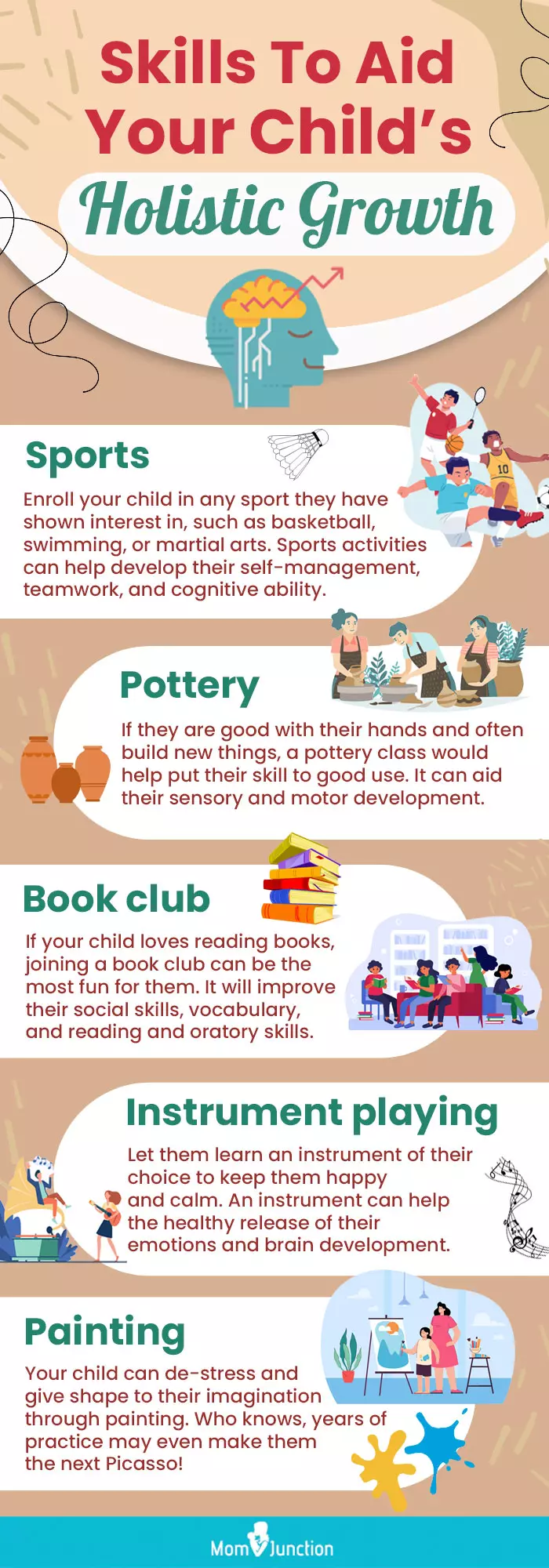
Illustration: Best Extra Curricular Activities For Kids
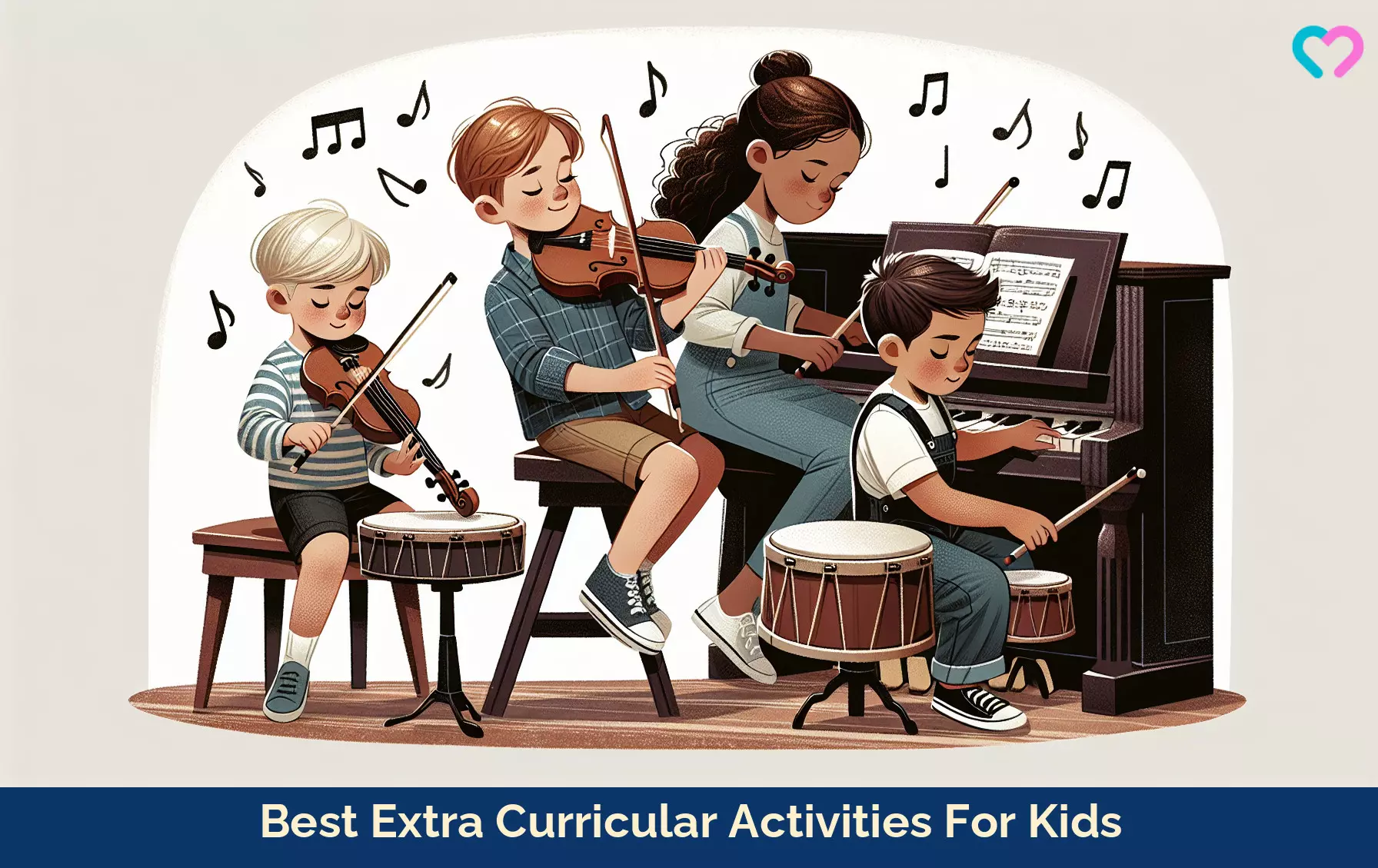
Image: Dall·E/MomJunction Design Team
Children learn several crucial life skills when they are involved in extracurricular games. This video explains everything that your child can gain by participating in them.
Personal Experience: Source
MomJunction articles include first-hand experiences to provide you with better insights through real-life narratives. Here are the sources of personal accounts referenced in this article.
i. Don’t Let Your Child Miss Out! The Importance of Extracurricular Activities.https://www.youtube.com/watch?feature=shared&v=DW_oZ3sNKsc ii. Kids’ mental health and well-being: why extracurricular activities are crucial;
https://medium.com/@BrooklinErin/kids-mental-health-and-well-being-why-extracurricular-activities-are-crucial-62f1e782fe6d
References
- Jennifer A. Fredricks and Jacquelynne S. Eccles; (2008); Participation in Extra-curricular Activities in the Middle School Years: Are There Developmental Benefits for African American and European American Youth?
https://idp.springer.com/authorize?response_type=cookie&client_id=springerlink&redirect_uri=https%3A%2F%2Flink.springer.com%2Farticle%2F10.1007%2Fs10964-008-9309-4 - Extra-curricular Activities.
https://kidshealth.org/en/teens/involved-school.html - After-school activities: The pros and cons of filling your kids’ schedule.
https://choc.org/news/after-school-activities-the-pros-and-cons-of-filling-your-kids-schedule/ - Physical Activity and Physical Education: Relationship to Growth Development and Health.
https://www.ncbi.nlm.nih.gov/books/NBK201497/ - Xavier Allirot et.al; (2016); Involving children in cooking activities: A potential strategy for directing food choices toward novel foods containing vegetables.
https://pubmed.ncbi.nlm.nih.gov/27125429/ - The Benefits of Including Kids in the Kitchen.
https://extension.usu.edu/healthwellness/research/benefits-of-including-kids-in-the-kitchen - Play with clay.
https://extension.psu.edu/programs/betterkidcare/early-care/tip-pages/all/play-with-clay - Building Leadership Skills for Life: What Scouting Can Teach Us All.
https://www.scout.org/leadershipskillsforlife#:~:text=Scouting%20encourages%20young%20people%20tocritical%20trait%20for%20any%20leader. - 10 Lessons Children Can Learn by Volunteering.
https://www.invent.org/blog/trends-stem/benefits-of-volunteering - Introduction: Why a Book Club?
https://press.umich.edu/pdf/0472031090-intro.pdf - Benefits Of Learning A Language.
https://www.education.wa.edu.au/dl/m9q4gp - The Brain Benefits of Learning a Second Language at an Early Age.
https://novakdjokovicfoundation.org/brain-benefits-of-learning-a-second-language-at-early-age/ - Explore the Seven Benefits of Robotics in Education for Students.
https://www.spacefoundation.org/2023/01/04/7-benefits-of-robotics-for-students/ - Music and health.
https://www.health.harvard.edu/newsletter_article/music-and-health - Dance – health benefits.
https://www.betterhealth.vic.gov.au/health/healthyliving/dance-health-benefits - Abhimanyu U. B.; (2023); The Role of Theatre in Children’s Cognitive Development: An Analysis.
https://ijnrd.org/papers/IJNRD2302302.pdf - 6 Surprising Benefits of Painting for Children Every Parent Should Know.
https://wohum.org/6-surprising-benefits-of-painting-for-children/ - Wendy L. Chambers; (2018); “Colors and Kindness”: Nature Photography as a Means to support Academic Skill Development of Elementary Students at Risk.
https://digitalcommons.georgiasouthern.edu/cgi/viewcontent.cgi?article=1074&context=nyar - Manual for School Environmental Clubs.
https://www.oneplanetnetwork.org/sites/default/files/secm.pdf - More than just a game: Yoga for school-age children.
https://www.health.harvard.edu/blog/more-than-just-a-game-yoga-for-school-age-children-201601299055 - 2024 Summer Debate Camp | Boost Your Child’s Confidence.
https://www.americandebateleague.org/benefits-of-debate.html#/ - Nikki Wilson; (2009); Impact of Extracurricular Activities on Students.
https://www2.uwstout.edu/content/lib/thesis/2009/2009wilsonn.pdf - Carolina Caetano et.al; (2024); Are children spending too much time on enrichment activities?
https://www.sciencedirect.com/science/article/abs/pii/S0272775723001504?via%3Dihub - Prevent school stress: balance activities and play.
https://newswire.caes.uga.edu/story/2911/school-stress-addressed.html - Overscheduling activities can cause burn-out for children and parents.
https://www.uab.edu/news/youcanuse/item/7579-overscheduling-activities-can-cause-burn-out-for-children-and-parents - Finding the Balance With After-School Activities.
https://childmind.org/article/finding-the-balance-with-after-school-activities/
Community Experiences
Join the conversation and become a part of our nurturing community! Share your stories, experiences, and insights to connect with fellow parents.
Read full bio of Dr. Maymunah Yusuf Kadiri
Read full bio of Harshita Makvana
Read full bio of Deepa Thomas
Read full bio of Nisha Bharatan







